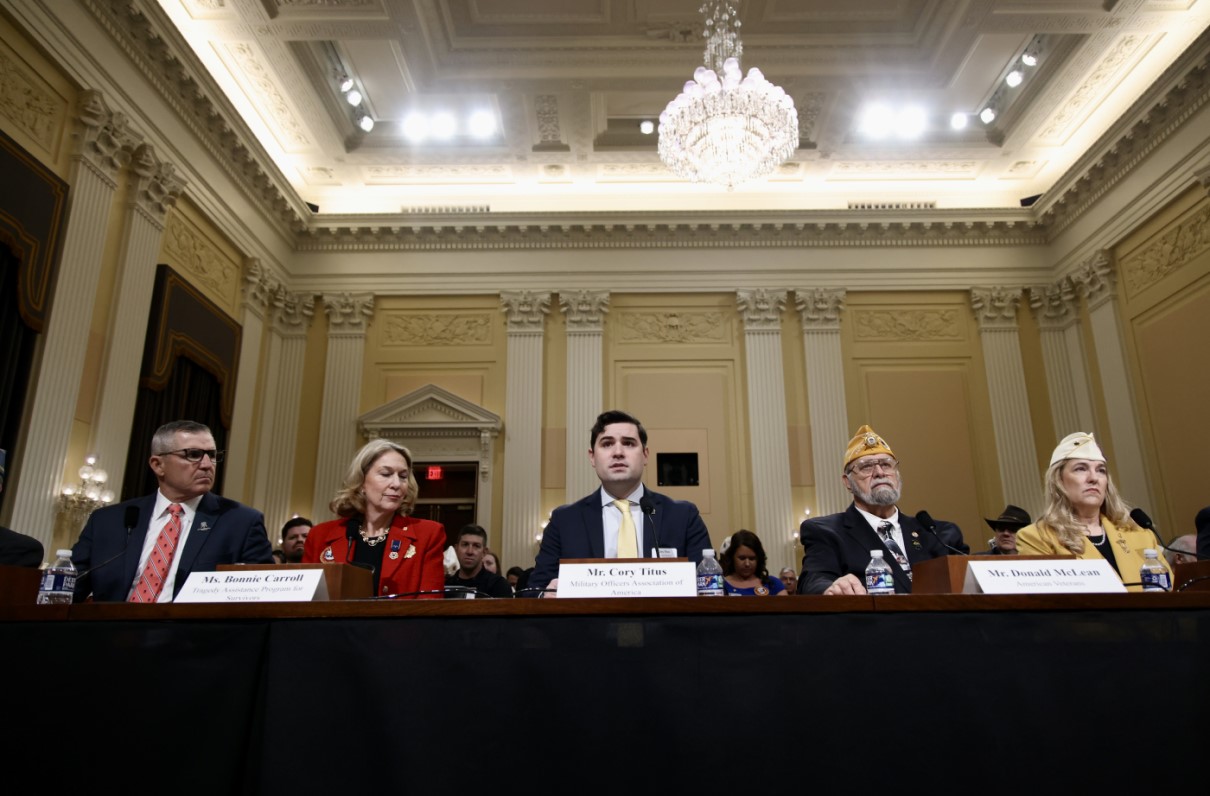MOAA presented its legislative priorities for veterans in front of a joint session of the House and Senate Veterans’ Affairs Committees on March 8, stressing the need to implement toxic exposure reforms, modernize and fully fund the VA, preserve and expand servicemembers’ consumer protections, and help reserve component members access the benefits they’ve earned.
The testimony offered MOAA an invaluable opportunity to convey MOAA’s commitment to servicemembers across the nation. MOAA’s Cory Titus, director of Government Relations for Veteran Benefits and Guard/Reserve Affairs, testified on the same day as representatives from several veterans service organizations, including the VFW, the Wounded Warrior Project, and Tragedy Assistance Program for Survivors (TAPS).
[WRITTEN TESTIMONY: Read MOAA’s Message to These Key Committees]
Titus praised the 117th Congress for passing the Sergeant First Class Heath Robinson Honoring our Promise to Address Comprehensive Toxics (PACT) Act last year, and reminded members of the 118th Congress that further work is needed, including VA modernization efforts, to ensure its reforms take shape.
“MOAA is always grateful for the chance to present our priorities to these critical committees, and laws like the PACT Act show lawmakers are listening,” Titus said after the hearing. “But there's always more work to be done on behalf of veterans, servicemembers, and their families, and our presence on the Hill -- both in these hearings and through grassroots support from our membership -- ensure that work continues."
More Work to Be Done
While the PACT Act “was comprehensive, it was not complete,” Titus told lawmakers, encouraging them to take an active role in ensuring the VA is timely and fair in its assessments of veterans’ claims.
Titus cited a Government Accountability Office (GAO) report that found only 8% of 130,000 Agent Orange claims for nerve damage, skin cysts, and blistering were granted by the VA between 2003 and 2021.
“We need Congress to ensure a grant rate better than 8%,” he told the joint committee. “MOAA recommends Congress add strict reporting requirements to ensure effective oversight on the grant rates of these conditions. If Congress or the VA creates a presumption, we must ensure it works as intended.”
[RELATED: VA.gov/PACT | MOAA.org/PACTResources]
Guard and Reserve Strength
Congress can take steps to improve the lives of reserve component members as a way to make Guard and Reserve service more desirable, Titus told lawmakers, citing the fact that five of the six service branches failed to meet their 2022 recruiting goals.
In addition to wanting Congress to review the consumer protections and rights provided by the Servicemembers Civil Relief Act (SCRA) and Uniformed Services Employment and Reemployment Rights Act (USERRA), MOAA would like to see more SCRA interest rate reductions for auto and personal loans and a fairer way to compensate service time for those seeking higher education.
“A Consumer Financial Protection Bureau report found very few eligible Guard and Reserve servicemembers received SCRA interest rate reductions,” Titus said. “…When less than 10 percent of eligible troops are receiving a benefit, we must reexamine how we implement that benefit.”
MOAA also will continue its efforts to ensure all service time counts equally toward earned benefits. This is not the case for many in the reserve component, where conflicting orders may affect what service counts toward programs such as the GI Bill.
Titus also expressed MOAA’s annual desire for a more predicable source of funding for the VA instead of relying on temporary budget fixes.
[RELATED: Late Start to Budget Process Puts Your Pay and Benefits at Risk]
“Continuing resolutions impede the department’s ability to fulfill our promises,” Titus said. “The VA needs timely and predictable funding to implement this historic legislation and other Congressionally mandated bills.”
Other MOAA legislative priorities for the 118th Congress outlined in written testimony include:
- Transforming a national cemetery to provide full military burial honors as a companion to Arlington National Cemetery as it approaches capacity.
- Increasing Dependency and Indemnity Compensation (DIC) for surviving spouses.
- Securing funding, staff, and other resources to accelerate delivery of home- and community-based services, long-term care, and caregiver support.
- Fully implementing VA’s Whole Health initiative and related services across the Veterans Health Administration.
- Eliminating disparities in health care delivery and research programs for women, minority, and underserved veterans.
[RELATED: Bill Would Preserve Full Burial Benefits as Arlington Cemetery Nears Capacity]
Learn more about MOAA’s legislative priorities at this link. See how you can contact your lawmakers to express your support for these priorities via MOAA’s Legislative Action Center.
Watch the full hearing below, or click here to jump directly to MOAA's testimony.
MOAA Looks Out For You
MOAA is committed to protecting the rights of servicemembers and their families. Lend your voice and support these efforts today. Because the larger our voice is, the greater our impact will be.

